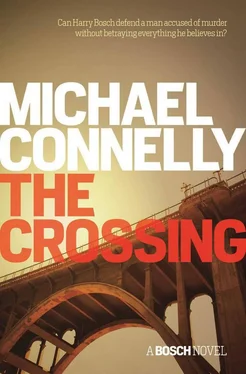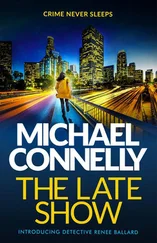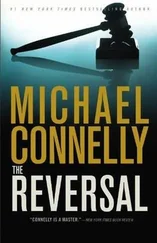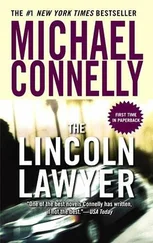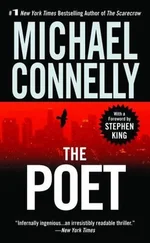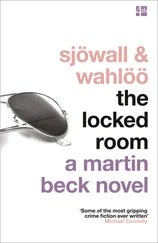Halfway into the playback, the recording was interrupted when Mickey Haller’s name popped up on the screen. He was calling Bosch’s phone.
“It’s my lawyer,” Bosch said. “All right if I take this?”
“Fine,” Sutton said. “Make it quick.”
Bosch stood up and took the phone out of the room and into the hallway so he could have some privacy.
“I’ve listened to the recording. Thank Christ you’re okay, brother,” Haller said.
“Yeah, it was a close one,” Bosch said. “I’ve just been playing it to a room full of cops — Sheriff’s and LAPD.”
There was a pause as Haller digested that.
“I’m not sure that was the right move,” he finally said.
“It’s the only move,” Bosch said. “It’s the only way I’m going to get out of here tonight. Besides, there are at least two in there I trust to do the right thing. One from each team.”
“Well, no doubt the recording is the Holy Grail. I wanna go in with a nine-nine-five as soon as we can. DQ’s going to walk right out of county after this. You did it, man. I was so fucking right about you.”
“Yeah, well, we’ll see.”
Bosch knew that a 995 motion in this case was essentially a petition to the court to change its mind based on new evidence. It would be filed before the judge who had held Da’Quan Foster over for trial at the preliminary hearing.
“Where are you, Whittier or West Hollywood?” Haller asked.
“West Hollywood substation,” Bosch said. “The same gang as before with a few more from the LAPD in the mix now.”
“I bet they’re not happy.”
“No, doesn’t look like it. Ellis and Long are their guys.”
Sutton stuck his head out from the boardroom and twirled a finger, signaling Bosch to wrap up the call and get back to the meeting and the playback. Bosch nodded and held up a finger. One minute.
“You need me to come over and kick some ass?” Haller asked.
“No, not yet,” Bosch said. “Let’s see how it goes. I’ll call you if I need you.”
“Okay, but remember what I told you last time. They’re not your friends anymore, Harry, and they certainly aren’t Da’Quan Foster’s friends. Watch yourself.”
“Got it.”
Bosch disconnected and went back in.
The playback continued, and at the thirty-four-minute mark, the intensity in the boardroom palpably heightened when on the recording Bosch said, “Is there anybody else here?”
Where Bosch had mostly kept quiet during the playback of the interview with Schubert, he now felt compelled to offer descriptions of what was happening in the office to supplement what was captured on the recording. The recording was clear to a zone of about six feet. Sounds and voices more distant were fuzzy and lacking clarity. Bosch tried to be brief with his descriptions so as not to overlap what was coming from the phone.
“We heard a noise, like a door closing out in the hall...”
“I was listening at the door to the office and I heard one of them say, ‘Clear.’ I knew they were out there searching for us...”
“I tipped the desk over because my first plan was to make a barricade...”
“The first three were Ellis shooting Schubert. The doctor had his hands up and posed no threat. He shot him three times. Then that was me yelling there and firing. Four shots, I think, at first. Then two more when Ellis was backing out, using Long as a shield.”
The recording ended with Bosch’s announcement to the deputy on the office phone that he was coming out. There was a gulf of silence from the investigators gathered around the table. Bosch then noticed Cornell shake his head and lean back in his chair in a dismissive manner.
“What?” Bosch said. “You’re going to stick with Foster as your guy?”
Cornell pointed at the phone that still sat in the middle of the table.
“You know what that is?” he asked. “It’s just a bunch of words. You’ve got nothing — no evidence — that directly links these two to Parks. And let’s not forget, you’re a guy suing your own department and you’ll do anything to embarrass it.”
Now Bosch shook his head dismissively and looked at Sutton, who was still in the posture he had adopted while listening to the playback, leaning forward, hands clasped on the table. He now extended a finger and pointed at Bosch’s phone.
“I need you to send me that,” he said.
“Me, too,” Mendenhall said.
Bosch nodded and picked up his phone. He moved a file containing a copy of the recording into an e-mail and then handed his phone to Sutton so he could type in his e-mail address. The process was then repeated with Mendenhall.
“Now what?” Bosch asked.
“You can go,” Sutton said.
Cornell made another gesture of dissatisfaction, tossing a hand up in the air. Sutton ignored it.
“Do us a favor, Harry,” Sutton said. “We’ve got a bunch of TV reporters outside the station, doing their stand-ups for the eleven-o’clock news. Don’t talk to them about any of this, huh? That won’t help anybody.”
Bosch stood up, putting his phone away.
“No worries,” he said. “What about the rest of my stuff? Wallet, gun, car?”
Sutton frowned.
“Uh, we’ll get you your wallet,” he said. “The car and gun we’re going to need to hang on to for the moment. We’re going to put together a full ballistics package and we’ll need the weapon for that. And that whole building is taped off and considered a crime scene right now. We’ll be working it for a few more hours. All right if we wait on the car until tomorrow morning?”
“No problem. I’ve got another at home.”
He knew he had another gun at home as well, but he didn’t mention that.
Standing up, Mendenhall put her notebook away in a leather satchel that doubled as purse and briefcase and probably contained her service weapon as well.
“I can give you a ride,” she said.
Mendenhall drove her company car toward Hollywood. Bosch judged that there had been a purpose beyond courtesy to her offering to give him a ride. After telling her he lived in the Cahuenga Pass, he got down to business, turning in his seat to look at her. She was a brunette with dark eyes and smooth skin. Bosch put her at late forties. Looking at her hands on the wheel, he saw no rings. He remembered that from Modesto. No rings.
“So, how come you ended up with this mess?” he asked.
“I would say it’s because of my familiarity with you. Your last interaction with IA is in litigation, so that created a conflict of interest with O’Dell. I was next on the list because of Modesto.”
Bosch’s lawsuit against the department for unfair labor practices named IAD investigator Martin O’Dell as a defendant along with several others involved in his being forced to retire. A few years before, Bosch had worked a case in which Mendenhall had trailed him to Modesto on suspicion that he was acting outside the policies of the department. She ended up helping him escape from captors who intended to kill him and clearing him of any departmental wrongdoing. The episode left Bosch with something he had never known before — respect for an Internal Affairs investigator. There had been a connection between them in Modesto. But because at the time he was the subject of an investigation being conducted by her, Bosch never did anything about it.
“Let me ask you something,” he said.
“You can ask me anything, Harry,” she said. “But I’m not promising to answer. Some things I can’t talk about. But just like before, you be straight with me, I’ll be straight with you.”
“Fair enough.”
“Which way should I go, Laurel Canyon up to Mulholland or down to Highland and then up?”
Читать дальше
